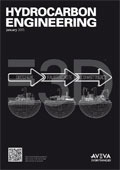Editorial comment
Happy New Year from all of us at Hydrocarbon Engineering; we hope you enjoyed the festive season! As one year ends and another begins, I sit down to the arduous task of collating and monitoring all the editorial topics that have proved to be popular over the year, and it always ends up being interesting and helpful for planning new editorial features. Inevitably, topics such as catalysts and sulfur can always be found in the top spots. However, this year water/wastewater/water treatment joined them.
Register for free »
Get started now for absolutely FREE, no credit card required.
Not only was water a popular topic in the magazine during 2012, but it also fuelled debate and discussion on our LinkedIn group. This extension drew my attention to the fact that water has been a hot topic in the industry in general, and not only within the realms of Hydrocarbon Engineering. Water is needed in all areas of life: from agriculture to energy to sanitation and of course for drinking. In the downstream industry alone it is used for everything from cracking to waste disposal to product cleansing. However, with competition for this resource increasing all over the globe, we appear to be beginning to take this cheap resource for granted, and there may well be troubled times on the way.
2012 was made the ‘European Year of Water’ in the hope that people all over the continent would learn the real value of this precious resource and understand that conservation is needed, for the sake of our ecosystems if nothing else. However, it was an ‘Outlooks on Energy’ comment from KBC that really drew my attention to the plight the downstream industry is facing. The article reports on a European refinery that forced a step change reduction in intake water to simply stay in business after its major water source was redirected to agriculture. It highlighted the growing number of plant expansions and upgrades in the Far East that have been forced to halt until the governments’ water utilisation targets are met and it discussed the general increase in regulations and their enforcement concerning refinery water systems around the globe.
However, whilst the above seems like ‘bad news’, KBC believes that as refineries are ‘threatened and forced to spend large sums on equipment that does nothing for the bottom line,’ there is light at the end of the tunnel. The company asserts ‘that application of structured techniques, some simple, some advanced, can give refiners big water savings, without resorting to high capex solutions.’ So, is an all round and simpler approach to water use, recycling and reuse going to be the better way forward for our industry? Should we evaluate and assess the straightforward things like meters, operational excellence and new technology potential? I am inclined to say yes as we will most likely end up with maximum results from minimum expenditure (and we may even be able to adopt some water saving and recycling principles in the home to lend an extra helping hand).

